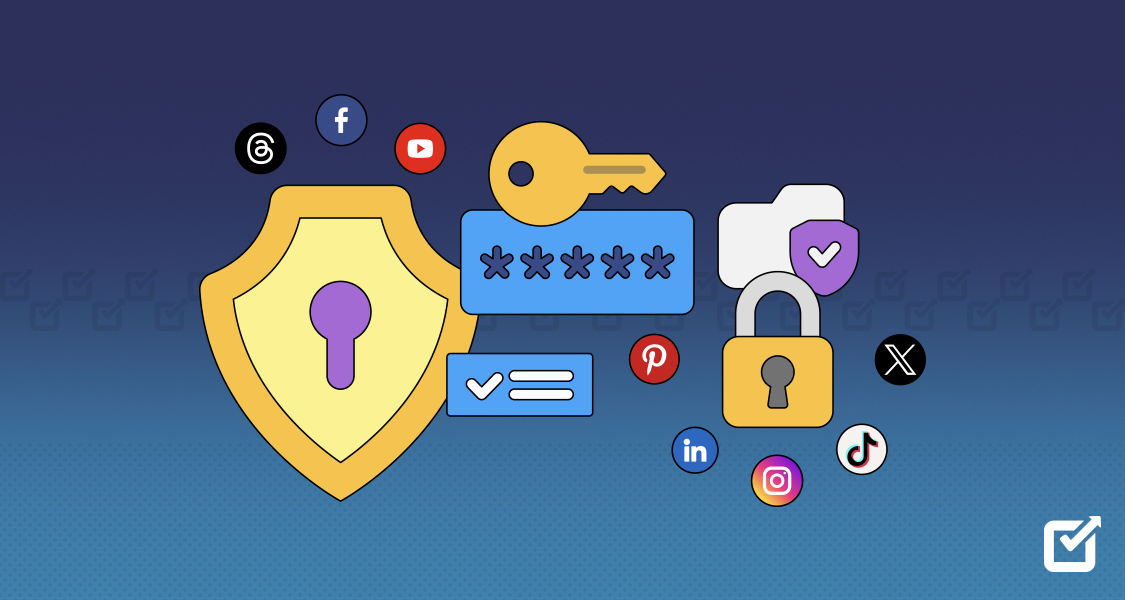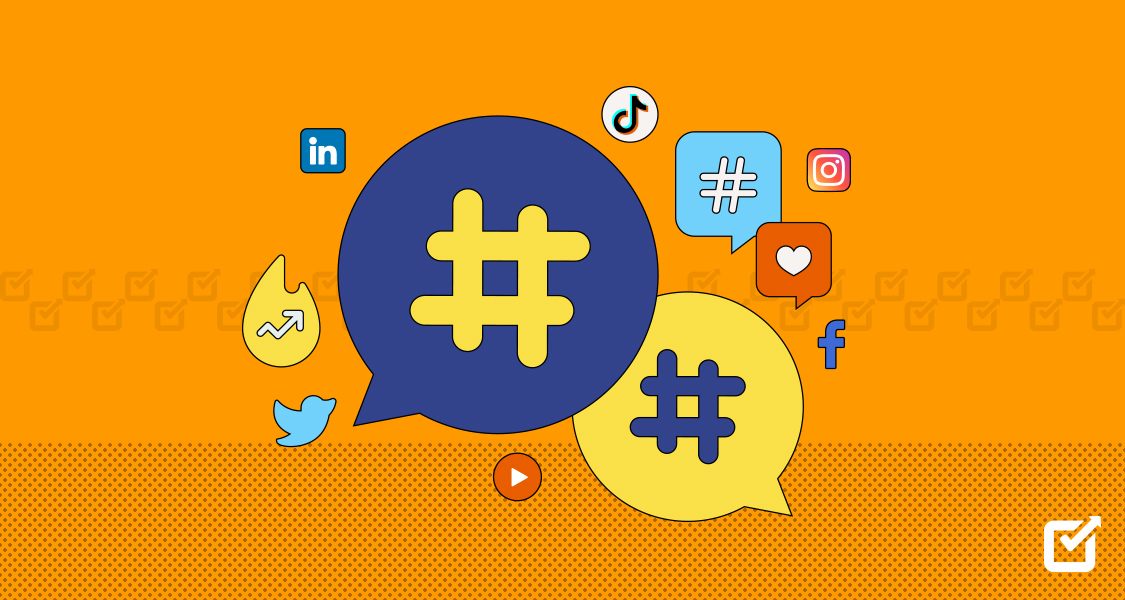Social media is a dynamic world, constantly evolving and offering exciting ways to connect and share. Just like any vibrant environment, however, it’s important to be mindful of your security and navigate with confidence.
With new challenges and opportunities always popping up, keeping yourself safe online can feel overwhelming. But don’t worry; here’s your friendly guide to help you easily explore the ever-changing social media landscape.
Think of this blog as your personal toolkit, packed with insightful advice and valuable resources to help you build a strong and secure online presence. And speaking of toolkits, have you tried a social media post scheduler? It can make your content scheduling super simple!
Let’s explore the more valuable social media security techniques in this blog and offer insightful advice on how to protect your online accounts in 2024 and beyond.
What Is Social Media Security?
Social media security refers to the measures and practices implemented to protect individuals, organizations, and their data from various threats and risks associated with using social media platforms.

While offering many benefits, such as connectivity, communication, and networking, these platforms pose significant security challenges. Social media security is essential for getting better results.
Social media security offers a range of concerns, including:
- Privacy: Controlling who sees your information and ensuring it’s not accessed by unauthorized individuals.
- Identity theft prevention: Stopping hackers from taking over your accounts and potentially harming others in your name.
- Cybersecurity: Staying safe from malware, phishing attempts, and social engineering tricks designed to steal your information.
- Reputation management: Managing your online image and minimizing the impact of negative content.
- Data protection: Safeguarding your personal information, photos, videos, and messages on social media platforms.
Schedule Smart, Post Secure With Social Champ
Post worry-free across all platforms with secure scheduling and built-in security features.
The Most Common Social Media Security Risks
Social media platforms, while providing various benefits and opportunities for connectivity, also come with few security risks. Understanding these risks is important for individuals and organizations to effectively mitigate potential threats. Here are some of the most common social security risks:
- Phishing scams: Imagine someone pretending to be your bank, tricking you into giving away your password. That’s phishing, and it happens a lot on social media. Be careful of suspicious messages and links, even if they seem to come from someone you know.
- Identity theft: Sharing too much personal information online can make you a target for identity thieves. They might use your info to open fake accounts, steal money, or cause all sorts of trouble. Keep your personal stuff on lockdown!
- Malware attacks: Think of malware like tiny digital viruses. They can spread through social media, hiding in links or attachments. Clicking on them can infect your device and steal your data. Don’t click on anything that seems fishy!
- Account hijacking: This is when someone else takes over your account, like a social media bandit! They can then spread spam, scam your friends, or generally make a mess of things. Use strong passwords and be careful who you share your login info with.
- Data breaches: Imagine a giant vault full of user information, and someone cracks the code. That’s a data breach. It can expose your personal data and put you at risk. Be cautious about what information you share on social media.
- Fake profiles and impersonation: Ever met someone online who seemed a little too perfect? They might be an imposter! Fake profiles are used to spread lies, scam people, and damage reputations. Be wary of who you interact with online.
- Privacy violations: Sometimes, social media platforms collect more information about you than you realize. This data can be used for advertising or even sold to other companies. Be sure to adjust your privacy settings to control what information you share.
- Cyberbullying and harassment: Social media can be a breeding ground for negativity. Bullies can use it to target and harass others, causing emotional harm and distress. If you see or experience cyberbullying, report it and don’t be afraid to seek help.
- Misinformation and disinformation: Fake news travels fast online, and social media is no exception. Be critical of the information you see, and don’t share anything you can’t verify.
- Third-party app risks: Those fun quizzes and games you connect to your social media? They might be asking for more information than they need. Be cautious about what permissions you grant to third-party apps, and only connect to those you trust.
When discussing cybersecurity threats like phishing scams or identity theft within social media platforms, it’s equally important to understand the broader cybersecurity landscape. Having insights into cybersecurity investments can provide better decision-making for both individuals and organizations aiming to safeguard data. Utilize a cybersecurity ROI calculator to measure your security practices’ effectiveness and potential cost savings.
Social media security awareness is important to protect data when utilizing social media sites. Strong security procedures, such as creating one-of-a-kind passwords, turning on two-factor authentication, and being wary of dubious connections, can help reduce these threats and improve security.
Featured Article: How to Make Money on Social Media in 2025: A Step-by-Step Guide
10 Social Media Security Best Practices
Social media has become a complex part of modern life, connecting billions of people across the globe. However, the convenience and connectivity offered by these platforms come with a lot of security risks that must be addressed proactively.
In this era of rampant cybercrime and data breaches, it is imperative that individuals and organizations adopt robust social media security practices to safeguard their digital identities and sensitive information. Here’s what you can do:
- Use Strong Passwords: One of the fundamental steps in securing your social media accounts is creating strong, unique passwords. Avoid using easily guessable passwords such as “password123” or common phrases. Instead, opt for complex combinations of letters, numbers, and special characters. Consider using a reputable password manager to generate and store passwords securely.

A snapshot of Linkedin
- Enable Two-Factor Authentication (2FA): Two-factor authentication adds an extra layer of security by requiring a second form of verification, in addition to your password. This could be a code sent to your mobile device via SMS or generated by an authenticator app. By enabling 2FA, you significantly reduce the risk of unauthorized access to your social media accounts, even if your password is compromised.
- Be Cautious with Third-Party Apps: Third-party apps often request access to your social media accounts for various purposes, such as analytics or integration with other services. Before granting permissions, carefully review the access requested by the app and consider the necessity of granting such permissions. Avoid granting access to apps from untrusted sources, as they could potentially compromise your account security.
- Regularly Review Privacy Settings: Social media platforms offer granular privacy settings that allow you to control who can see your posts, send you friend requests, or access your personal information. Take the time to review and adjust these settings according to your preferences. Limit the visibility of sensitive information and customize privacy settings to align with your comfort level.
- Limit Personal Information: Be mindful of the personal information you share on social media platforms. Avoid posting sensitive details, such as your home address, phone number, or financial information publicly. Consider the potential implications of sharing personal information and exercise caution when disclosing it online.
- Beware of Phishing Attempts: Phishing is a common tactic used by cybercriminals to trick individuals into revealing sensitive information or login credentials. Be vigilant of suspicious messages or emails claiming to be from social media platforms. Verify the authenticity of such communications before clicking on any links or providing any information.
- Stay Updated: Keep your social media apps and devices up to date with the latest security patches and updates. Developers regularly release updates to address security vulnerabilities and enhance overall security. Enable automatic updates whenever possible to ensure you’re protected against known threats.
- Educate Yourself: Stay informed about common social engineering tactics and scams prevalent on social media platforms. Educate yourself about the warning signs of phishing attempts, fake accounts, or malicious links. By increasing your awareness of potential threats, you can better protect yourself from falling victim to them. You can also enhance your response to security incidents by utilizing open-source tools for incident management.
- Use Secure Connections: When accessing your social media accounts, ensure you’re using secure and trusted networks. Avoid logging in to your accounts on public Wi-Fi networks or unsecured connections, as these can be compromised by malicious actors. Consider using a virtual private network (VPN) for added security when accessing social media on public networks.
- Regularly Monitor Activity: Frequently monitor your social media accounts for any unusual activity or unauthorized access. Keep an eye out for unrecognized logins, suspicious messages, or changes to your account settings. If you detect any suspicious activity, take immediate action to secure your account and report any potential security breaches to the platform.
Featured Article: Top 15+ AI Tools for Social Media in 2025
10 Social Media Security Tools That Will Keep Your Accounts Safe
There are several security tools and applications available that can help enhance the security of your social media accounts and protect your personal information. Here are ten media security tools that can help keep your accounts safe, before using these tools must read a social media security policy.
- LastPass or 1Password (Password Managers): Password managers like LastPass or 1Password help you generate and store strong, unique passwords for each of your social media accounts. They also offer features like password auditing and secure password sharing, making it easier to manage and secure your login credentials.
- Google Authenticator or Authy (Two-Factor Authentication Apps): Two-factor authentication (2FA) adds an extra layer of security to your social media accounts. Apps like Google Authenticator or Authy generate Time-Based One-Time Passwords (TOTPs) that serve as the second factor for authentication, making it more difficult for attackers to gain unauthorized access to your accounts.
- BitDefender or Norton (Antivirus Software): Antivirus software such as BitDefender or Norton can help protect your devices from malware, viruses, and other online threats. By scanning for malicious software and blocking suspicious websites, antivirus software can prevent malware infections that could compromise your social media accounts.
- Malwarebytes (Anti-Malware Tool): Malwarebytes is an anti-malware tool that specializes in detecting and removing various types of malware, including spyware, adware, and ransomware. Running regular scans with Malwarebytes can help detect and remove malware that may target your social media accounts.
- Privacy Badger or Ghostery (Browser Extensions): Browser extensions like Privacy Badger or Ghostery help protect your privacy by blocking trackers, third-party cookies, and other forms of online tracking used by social media platforms and advertisers. By preventing tracking, these extensions can help reduce the amount of personal information shared online.
- HTTPS Everywhere (Browser Extension): HTTPS Everywhere is a browser extension developed by the Electronic Frontier Foundation (EFF) that automatically encrypts your web browsing by forcing websites to use HTTPS whenever possible. This encryption helps protect your sensitive information, such as login credentials, when accessing social media accounts.
- Social Champ (Social Media Management Tools): Social media management tools like Social Champ offer features for scheduling posts, managing multiple accounts, and monitoring social media activity. By centralizing your social media management, these tools can help prevent unauthorized access and streamline security procedures.
- Trend Micro or McAfee (Social Media Privacy Scanners): Some cybersecurity companies offer social media privacy scanners that analyze your social media profiles and settings for potential privacy risks. Tools like Trend Micro’s “Check Your Privacy” or McAfee’s “Social Scan” provide insights and recommendations for improving your social media privacy settings.
- Ghosty or Social Searcher (Profile Stalkers Detection Tools): Profile stalker detection tools like Ghosty or Social Searcher claim to identify users who have viewed your social media profiles. While the accuracy of these tools may vary, they can help raise awareness about potential privacy risks and encourage users to review their security settings.
- Trusteer Rapport or Avast Secure Browser (Secure Browsers): Secure browsers such as Trusteer Rapport or Avast Secure Browser offer built-in features for protecting your online privacy and security. These browsers often include features like anti-phishing protection, ad blocking, and secure browsing modes that can help keep your social media accounts safe.
You may enhance the security of your online experience, lower your chance of becoming a victim of cyberattacks, and better secure your personal information by adding to these social media security examples.
In Conclusion
In this interconnected world of today, where social media is a big part of our everyday lives, it is more important than ever to protect our online presence. Through the use of a variety of strong security solutions and the adoption of best practices, people may effectively guard their social media accounts against different types of attacks.
There is a vast array of social media security solutions available to improve defence against phishing attacks, malware infections, and privacy violations. These tools vary from password managers and two-factor authentication apps to antivirus software and privacy-focused browser extensions.
Updating security measures regularly and remaining aware of new dangers and social media security issues are also crucial to keeping your online presence safe.











